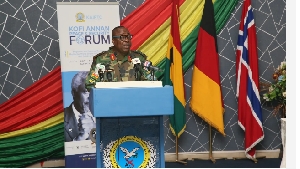 Major General Richard Addo Gyane, Commandant, KAIPTC
Major General Richard Addo Gyane, Commandant, KAIPTC
The 2024 Kofi Annan Peace and Security (KAPS) Forum, which is aimed at stimulating critical discussions on migration and peacebuilding in Africa, is slated for February 27 to 28, 2024.
Hosted by the Kofi Annan International Peacekeeping Training Centre (KAIPTC), this year’s KAPS Forum is titled “Migration and Societal Resilience in a Multipolar World Order: Addressing Conflicts and Building Peace in Africa.”
The Forum, the third in a series, seeks to honour the memory of the late Mr. Kofi Annan, former UN Secretary-General, for his role in peacekeeping and for promoting global peace and security.
President Nana Addo Dankwah Akuffo-Addo will be the guest of honour with some 200 delegates, including former African Heads of State, government officials, high-level diplomats, and representatives from the United Nations, African Union, and Economic Community of West African States (ECOWAS), expected to attend the two-day Forum.
It will feature broad thematic discussions on migration, sustainable development, conflicts, and societal resilience in a multipolar world order, all of which are key drivers of migration in Africa.
Funded by the Governments of Norway and Germany, the KAPS Forum 2024, being implemented by the German Technical Cooperation (GIZ), will provide a platform for delegates and participants to explore approaches to addressing migration-related conflicts through effective policies and peacebuilding mechanisms in the region.
Major General Richard Addo Gyane, Commandant, KAIPTC, speaking at a media launch of the 2024 forum, said as political tremors shook continents, the world order transitioned from a unipolar landscape to a multipolar one.
This shift, coupled with recent crises in Africa, Europe and the Middle East, was pushing migration trends to new heights.
He said Africa was faced with armed conflicts which had created instability in countries like Ethiopia, Mali, South Sudan, and the Democratic Republic of Congo, forcing people to flee their homes.
The Commandant said Climate Change was increasingly causing droughts, floods and extreme weather conditions, which were increasingly displacing communities, particularly in the Sahel region and East Africa.
“Weak governance and economic hardship continued to heavily increase poverty levels across the board. Unemployment, lack of access to basic necessities, corruption, human rights abuses and political repression continued to influence young people especially to seek opportunities elsewhere,” he said.
Driven by the need to address the complex link between migration and security, Maj Gen Gyane said the KAPS Forum would effectively discuss the impact of migration on security, forging solutions and collaborations to prevent instability.
Sivine Jansen, a representative of the German Embassy in Ghana, said the world was in a critical time as, within a short time, there had been several military coups in the regions that bordered Ghana.
She said that the sub-region is becoming increasingly unstable with new challenges coupled with three francophone countries leaving ECOWAS at the end of January, putting some strain on the regional architecture.
“In this urban conflict situation, there is a demand on all of us to find new ways of collaboration with particular relevance given to capacity building,” she said.
The 2023 World Development Report shows that 2.3 per cent of the world’s population live outside of their country of nationality, amounting to some 184 million people, with 37 million of those refugees who left their homes involuntarily.
These numbers, she said, made migration one of the world’s complex and pressing challenges, as the United Nations High Commissioner for Refugees had counted some 62.2 million internally displaced persons.
Ms. Jansen said it put a double strain, particularly on low- and middle-income countries, adding that crises in the Sahel Region and protracted conflicts in the Horn of Africa had witnessed millions of Africans displaced.
To respond to those challenges, she said, “we must put our efforts to emphasise resilience for survivors, frugality, and adaptation. These efforts must be complemented by building peace that targets the underlying drivers of conflict such as poverty, inequality and governance.”
KAIPTC, Jansen said, was well equipped as a peace training centre on the African continent to tackle those challenges, which is evidenced by the long-standing relationship and close cooperation the German government had with the KAIPTC.
Ernest Ansah Lartey, the Coordinator of the KAPS Forum, giving the rationale for the Forum, said, among others, it would deepen and strengthen the collaboration between KAIPTC, United Nations (UN), African Union (AU), ECOWAS, Governments, Civil Society Organisations (CSOs), especially the academia, Development Partners and Private Business Community.